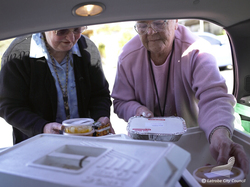Across Georgia, subsidized nutrition programs are slashed
By Emily Green, Georgia Online News Service
As the daughter of a sharecropper, Cecile Bell spent her childhood working in the fields. Today, at 89, she rarely moves from the oversized green sofa chair in front of the television in her living room.
Cecile lives with her husband, Henry, 88, in rural Upson County in Georgia. For about a year the government-subsidized program Meals on Wheels delivered food to their house five days a week, but about five months the service stopped because of the deficit in the state budget.
The budget shortfall has hit food services to seniors across Georgia. In fiscal year 2009, there was a more than 30-percent cut to programs that feed the elderly. Nutrition programs for seniors -- which come in the form of Meals on Wheels and subsidized lunch services at senior centers -- are in turn cutting back their services.
Upson County, where the Bells live, had to take 40 seniors off Meals on Wheels from its original group of about 85. The Bells were removed from the program because their son lives down the road.
Still, the Bell's son is not young and has his own health problems, so it falls to Henry to make sure he and Cecile have something to eat. He drives every morning about two miles to the local McDonalds, where he picks up the same thing: two sausage-biscuits, two orders of hash-browns, two apple pies and one cup of coffee.
That does not always sit well with Cecile, who can no longer stand long enough to cook.
"You going and getting these chicken sandwiches and these hamburgers and these French fries and these onion rings and they going to cost up, and still they don't feed up," she said.
Senior centers that provide subsidized lunches are also taking money-saving steps. Some have opted to serve lunch only three or four days a week. Others, like the Brunswick Multi-purpose Center, have put an indefinite hold on adding new people to its meal program.
"We don't want to come July 1st and say, 'OK, we put you on and now we are going to have to put you back on a waiting list.' So we are a little bit afraid of what's going to happen until July and we know we have funding in place," says Darlene Wyems, who runs the Brunswick Multi-purpose Center.
Already, the center's lunch program, which serves about 65 seniors a day, has raised its suggested lunch price from $1 to $2. There's also some money coming from the city of Brunswick but that's only enough to keep the status quo. Wyems says until additional money is found, a waiting list is necessary.
Shirley Baker is among the center's regular diners.
"We know we'll be well be well and nourished. We'll have food that's good for us. Believe me we don't get a bunch of fried stuff," says Baker, who was looking forward to that day's meal. On the menu was pork shops, broccoli, mashed potatoes, milk, a bun and a custard-like desert called pineapple delight.
Advocates for seniors say nutrition programs save money in the long run because it keeps the elderly healthy and out of nursing homes. But Georgia state government officials say that with an initial $2 billion dollar budget hole, the money was simply not there and cuts had to be made across the board.
Last week, Georgia state lawmakers passed the budget for fiscal year 2010. It includes $1 million federal stimulus dollars for food programs for seniors. Yet even with those additional funds, advocates say that will only maintain the status quo of the food programs. That means Cecile and Henry Bell may not get healthy meals until the economy turns around.

